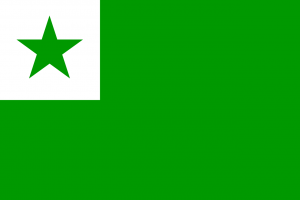Difference between revisions of "Language/Esperanto/Vocabulary/Count-to-10"
< Language | Esperanto | Vocabulary
Jump to navigation
Jump to search
m (Quick edit) |
m (Quick edit) |
||
| Line 46: | Line 46: | ||
* [[Language/Esperanto/Vocabulary/Food|Food]] | * [[Language/Esperanto/Vocabulary/Food|Food]] | ||
* [[Language/Esperanto/Vocabulary/Family|Family]] | * [[Language/Esperanto/Vocabulary/Family|Family]] | ||
==Videos== | |||
===Counting Numbers in Esperanto (Unu, Du, Tri, etc.) - YouTube=== | |||
<youtube>https://www.youtube.com/watch?v=ZM7818KcKqY</youtube> | |||
{{Esperanto-Page-Bottom}} | {{Esperanto-Page-Bottom}} | ||
Revision as of 16:33, 22 February 2023
Esperanto Vocabulary - Count to 10
Welcome to the Esperanto Vocabulary - Count to 10 lesson. Here you will learn the basics of counting in Esperanto. Please feel free to edit this wiki page if you think it can be improved. 😎
Main Words
Here are some of the most common words used for counting in Esperanto:
| Word in Esperanto | Pronunciation | English Translation |
|---|---|---|
| unu | uˈnu | one |
| du | du | two |
| tri | tri | three |
| kvar | ˈkvar | four |
| kvin | ˈkvin | five |
| ses | ses | six |
| sep | sep | seven |
| ok | ˈok | eight |
| naŭ | ˈnaŭ | nine |
| dek | dek | ten |
Useful Phrases
Here are some useful phrases using the words above:
- Mi havas kvin monerojn. (mi ˈha.vas ˈkvin ˈmo.ne.rojn) – I have five coins.
- Ni havas sep librojn. (ni ˈha.vas sep ˈli.brojn) – We have seven books.
- Li havas dek krajonojn. (li ˈha.vas dek ˈkra.jo.nojn) – He has ten pencils.
Related Lessons
Videos
Counting Numbers in Esperanto (Unu, Du, Tri, etc.) - YouTube
